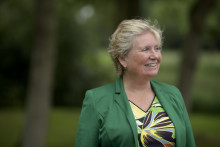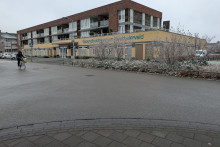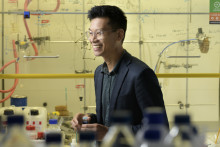Every day, it takes Tabak a one-hour drive from Salland to Enschede. This is no unfamiliar territory; She trained as a biomedical engineer at the UT, and previously worked for the Roessingh institute. In her own words, she was 'raised in Twente' in that respect. She also works closely with other departments and hospitals in the region. 'Twente is a nice place to work.'
RE-SAMPLE
Tabak is concerned with the question of how to develop smart technology to improve care, especially for people with a chronic condition. One of the European research projects that she coordinates on the basis of this principle is RE-SAMPLE.
Currently, healthcare is still quite reactive, according to Tabak. 'People often report complaints too late. This can lead to all kinds of problems that may have been prevented. This also applies to people with so-called multimorbidity; if they have several chronic conditions at the same time. Suppose you have COPD, a lung disease, but also suffer from chronic heart failure or an anxiety disorder. If you then suffer from shortness of breath, the cause may be one of those three. But because our care is divided into islands, the so-called silos, a proper diagnosis may take too long.'
Three birds with one stone
By having people measure things themselves at home with sensors and by having them fill in questionnaires, professionals can see such attacks coming much earlier and prescribe an appropriate treatment. To properly interpret all this data, the researchers use AI models. Tabak: 'With this proactive method, we kill three birds with one stone. We make sure that the person feels better in general, spare them an underprepared hospital visit, and as such relieve the pressure on the healthcare system.'
The result is an eHealth program that is now being tested in three hospitals. Her personal drive? She wants to solve problems. 'That's in our nature as engineers, I think.' But she also wants care to remain widely available. 'To make sure we won't have to choose who gets help or not.'
Personalised eHealth Technology Chair
Another goal is to involve people with a chronic condition more in their own health care. 'The name says it all: we want to create, research and evaluate personalised eHealth technology. This is based on three pillars. First, you need to understand what you need to measure to gain more insight into the course of a chronic condition, or in order to predict a deterioration. The second is the decision: how to combine the collected data, insights and knowledge into appropriate advice, for example about medication or lifestyle. Thirdly, we help find the appropriate coaching to achieve this goal, such as a virtual coach who guides you along into a healthy lifestyle. A criterium is that it must be understandable and workable, so that people can adjust their behaviour on their own. 'Gamification, for example, works well to playfully nudge children in the right direction. But it can come across as a bit unserious to the elderly. It's all a matter of good evaluation, in order to be able to further refine the process.'
Care pathway
To make eHealth part of daily care practice, Tabak takes a close look at the entire care pathway, the path that someone takes when they need care. 'If you don't change anything else about how healthcare is set up and then add an app on top of it, it will only be an extra burden to everyone. You have to make it part of a new routine and teach people how to work, meaning both the patient and the caregiver.’ That also involves developing courses, tutorials and manuals.
Redistribution of tasks
The possibilities of eHealth also allow for a redistribution of tasks. Tabak: 'In hospitals, for example, medical and nursing specialists still have a lot on their plate. Smart technology helps us organise this differently, by also involving patients themselves. For example, for children with asthma, we have developed a care pathway in MST in which the technical physician plays an important role. Asthma control is monitored remotely while the child learns to deal with the asthma through self-management. The technical physician analyses the data to see how the child is doing, so that children only need to go to the hospital when necessary. This saves medical specialists a lot of time, so that they have their hands free for more complex cases. In a process that is already underway, we have achieved an 80% reduction in healthcare consumption.'
'eHealth gives patients more insights in general, but they don't want to be continuously confronted with their illness’
A small dilemma that Tabak faces is that an eHealth solution requires a relatively large amount of attention in the patient's life. 'As a patient, you gain much more insight into and control over your own health, but you don't want to be continuously confronted with your illness.' She hopes to solve this issue by developing prototypes together with patients and caregivers and thus improving it step by step.
Triangular relationship
The idea is to create a triangular relationship between patients, healthcare providers, and technology. 'As a patient, you work on a plan together with your medical professional. A virtual coach can help you implement it independently.'
Tabak supervises students and PhD candidates from all kinds of backgrounds, from biomedical engineering, health sciences and technical medicine to creative technology. In her projects, she always works closely with different disciplines at the UT and beyond: 'eHealth technology is developed together. RE-SAMPLE is a European example, but we also work together a lot in this region. We manage the paediatric asthma project with MST. We also work in various projects with ZGT and the Deventer hospital.'
More specialised digital care
Wouldn't it all feel more impersonal if everything is done via an app? According to Tabak, that depends on your definition. 'You may see the doctor less often, but the care you receive is more specifically geared towards your personal situation. At the same time, eHealth technology allows us to collect a lot of information about a patient in advance. That saves time if the person does come to the consultation, so that the doctor will be better prepared and can go deeper into the matter.'
For the future, Tabak hopes that healthcare will become better and smarter. 'So that we can prevent as much as possible in the future. And that those who do need it receive the most specific help possible.'







